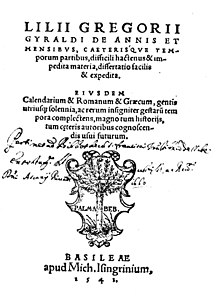Lilius Gregorius Giraldus
Lilius Gregorius Giraldus (also Gyraldus , Italian Lilio Gregorio Giraldi ; born June 14, 1479 in Ferrara , † February 1552 ) was an Italian scholar, mythographer and poet of the Renaissance .
Life
After training in Ferrara, Giraldi first went to Naples , where he met Giovanni Pontano and Jacopo Sannazaro , and then to Lombardy to the Mirandola family . In 1507 he learned Greek with Demetrios Chalkondyles in Milan and shortly afterwards became tutor of the later Cardinal Ercole Rangone. Around the year 1514 he was appointed apostolic protonotary under Clement VII . However, when he had lost all his fortune and his patron Cardinal Rangone at the same time as the Sacco di Roma ("the pillage of Rome") in 1527 , he returned to the Mirandola, impoverished. In the riots that followed the reigning prince's assassination in 1533, he was expelled again and spent the rest of his life in poverty and ill health. Michel de Montaigne laments his end in one of his essays (i.34).
meaning
Giraldi was known for his great learning. With De deis gentium historia he wrote a mythographic handbook, which was only overtaken by the mythologia of Natale Conti . With his treatises De annis et mensibus and the Calendarium Romanum et Graecum , he contributed to the coming about of the calendar reform of Pope Gregory XIII. at.
Fonts
- De musis syntagma (Strasbourg 1507, 1511, 1539)
- Libellus in quo aenigmata pleraque antiquorum explicantur (Basel 1539, 1551)
- Paroeneticus Liber adversus ingratos (Florence 1539, 1548, 1551)
- Herculis vita (Basel 1539, 1540)
- Symbolorum Pythagorae Interpretatio, cui adiecta sunt Pythagorica Praecepta mystica a Plutarcho interpretata (Basel 1539, 1551)
- Libellus quomodo quis ingrati nomen et crimen effugere possit (Basel 1539, 1551)
- De sepulchris et vario sepeliendi ritu (Basel 1539)
- Epithalamia (1539)
- Indicium vocalium (1539)
- De Re Nautica Libellus (Basel 1540)
- De Annis et Mensibus, caeterisque temporum partibus and Calendarium et Romanum et Graecum, gentis utriusque solennia, ac rerum insigniter gestarum tempora complectens (Basel 1541)
- Historiae poetarum tam graecorum quam latinorum dialogi decem (Basel 1545)
- De Deis Gentium varia et multiplex Historia, in qua simul de eorum imaginibus et cognominibus agitur (Basel 1548, Lyon 1565)
- De Poetis nostrorum temporum dialogi duo (Florence 1551)
- Progymnasma adversus Litteras et Litteratos (Florence 1551)
- Annotationum Dialogismi XXX. Item Laurentii Frizzolii Solaniensis Dialogismus unicus de ipsius Lilii vita et operibus (Venice 1552)
- Opera omnia 2 volumes (Basel 1580, Lyon 1696)
Editions and translations
- John N. Grant (Ed.): Lilio Gregorio Giraldi: Modern Poets. Harvard University Press, Cambridge (Massachusetts) 2011, ISBN 978-0-674-05575-9 (Latin text and English translation by Dialogi duo de poetis nostrorum temporum )
literature
- Simona Foà: Giraldi, Lilio Gregorio. In: Mario Caravale (ed.): Dizionario Biografico degli Italiani (DBI). Volume 56: Giovanni di Crescenzio – Giulietti. Istituto della Enciclopedia Italiana, Rome 2001.
- Karl AE Enenkel : The Making of 16th-Century Mythography: Giraldi's Syntagma de Musis (1507, 1511 and 1539), De Deis Gentium Historia (approx. 1500–1548) and Julien de Havrech's De Cognominibus Deorum Gentilium (1541) . In: Humanistica Lovaniensia 51, 2002, pp. 9-53.
- Jean Seznec : La survivance des dieux antiques. Essai sur le rôle de la tradition mythologique dans l'humanisme et dans l'art de la Renaissance (= Studies of the Warburg Institute , 11). 2nd Edition. Flammarion, Paris 1980 (reprinted 1993); German translation: The continued life of the ancient gods. The Mythological Tradition in Humanism and Renaissance Art , 1990
- Giraldi, Giglio Gregorio . In: Encyclopædia Britannica . 11th edition. tape 12 : Gichtel - harmonium . London 1910, p. 43 (English, full text [ Wikisource ]).
Web links
- Giraldi editions in the digital library of the Munich Digitization Center (MDZ)
| personal data | |
|---|---|
| SURNAME | Giraldus, Lilius Gregorius |
| ALTERNATIVE NAMES | Gyraldus, Lilius Gregorius; Giraldi, Giglio Gregorio |
| BRIEF DESCRIPTION | Italian scholar, mythographer and poet of the Renaissance |
| DATE OF BIRTH | June 14, 1479 |
| PLACE OF BIRTH | Ferrara |
| DATE OF DEATH | February 1552 |

